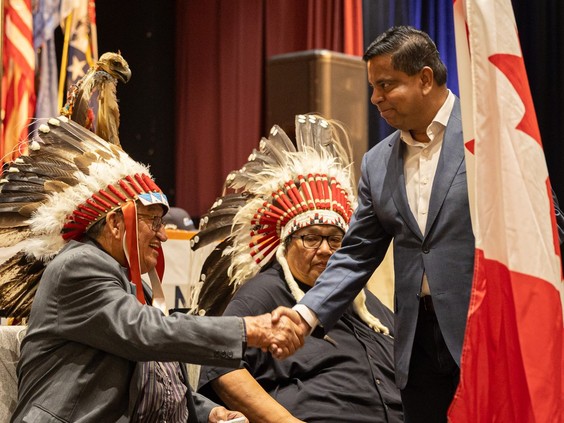
Wahpeton Dakota Nation Chief John Waditaka welcomed a federal government apology delivered on Monday, but said it needs to be accompanied by action.
Waditaka was among nine Dakota and Lakota chiefs who attended a gathering at Whitecap Dakota Nation where federal Minister of Crown-Indigenous Relations Minister Gary Anandasangaree apologised on behalf of the Government of Canada denying the First Nations their rights.
Waditaka, who leads the Wahpeton Dakota Nation northwest of Prince Albert, said the apology was important, but must be accompanied by “a clear and unwavering commitment” from the federal government to change the quality of life in Dakota communities.
“This apology is a significant step, but it must lead to tangible actions that ensoure our people’s future is one of prosperity, dignity, and respect,” Waditaka said in a press release. “Only then can we truly begin to heal and move forward together.”
The federal government said Dakota and Lakota Nations have called for an apology for past wrongs for a long time. In the apology on Monday, Anandasangaree acknowledged Canada failed to formally recognize the Dakota and Lakota as “Aboriginal peoples of Canada” within the meaning of Section 35 of Canada’s Constitution.
As a result, Dakota and Lakota Nations were not invited to sign treaties in the 1870s, and received no treaty rights or benefits. They also received smaller reserves than Treaty First Nations.
Waditaka said the recognition of Section 35 rights is critical, but argued those rights originated from the Wahpeton Dakota Nation’s “sovereignty and title to our lands”, which have never been extinguished.
In a press release, Anandasangaree said Dakota and Lakota First Nations were critical to Canada’s development, and the failure to recognize those contributions has had a profound impact. Among those contributions were support for the British Crown in defending the region that became Canada during the War of 1812.
“We deeply regret the time it has taken to acknowledge the rightful place of the Dakota and Lakota as Aboriginal peoples of Canada with constitutionally protected Section 35 rights and we apologize for the past harms suffered by generations as a result,” Anandasangaree said in a press release. “With today’s statement, we hope to being writing a new chapter where trust is rebuilt and respected and our Nation-to-Nation relationships are renewed for the benefit of generations to come.”
Anandasangaree delivered the apology during a ceremony at Whitecap Dakota Nation south of Saskatoon. Roughly 650 people were in attendance, including Dakota and Lakota leaders, elders, youth, and community members.
Whitecap Chief Darcy Bear said Dakota peoples helped create, defend, and building Canada into “a multicultural beacon of prosperity and tolerance,” but had been treated like foreigners in a land that had traditionally been their home.
“Last year, Canada finally acknowledged the Dakota as an Aboriginal People of Canada, and enshrined that recognition in the Whitecap Dakota Self-Government Treaty, brought into force with unanimous approval under Bill C-51,” Bear said in a press release. “This apology today builds on that affirmation, and takes us one further step ahead in the journey of healing and recognition that is so long overdue.”
Saskatchewan is home to three Dakota First Nations, and one Lakota First Nation who are not party to any historic treaty entered into between Canada and other First Nations.

